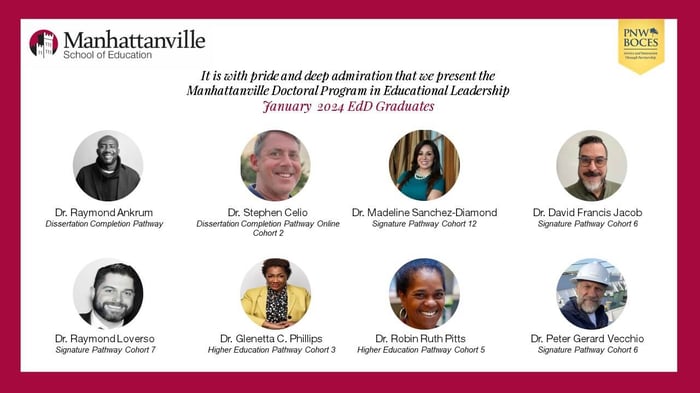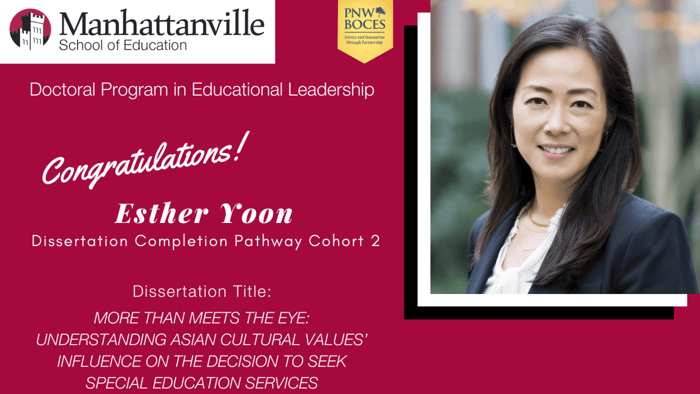The Manhattanville Doctoral Program in Educational Leadership celebrates 8 doctoral students who earned their EdD in January 2024. They join over 150 Manhattanville doctoral alumni. These 8 recent graduates have investigated important issues with the field of educational leadership.
Two studies have direct implications for teaching and science curriculum:
Dr. David Jacob, Regional Science Coordinator at PNW-BOCES, interviewed 20 elementary teachers who developed, piloted, and implemented an Elementary Science Curriculum (ESC), in an effort to understand in what ways their involvement in the process of curriculum development shaped their perceptions of the implementation. Findings can inform school leaders’ thinking about the relationship between learning standards and curriculum implementation and how these elements influence each other in the classroom.
Dr. Raymon Loverso, Assistant Superintendent for Curriculum, Instruction and Assessment with the Syosset City School District, and adjunct faculty in Graduate Counseling, Leadership & Education at Manhattan College, investigated the relationship between elementary teachers’ science teaching self-efficacy and the components of effective professional development as designated by Darling-Hammond et al. (2017). To do so, he developed and administered a survey that measured K-5 elementary school teachers’ perceived efficacy in teaching science lessons that incorporate science and engineering practices, disciplinary core ideas, and crosscutting concepts. Study outcomes show that effective professional development has statistically significant and meaningful effect sizes on different dimensions on science teaching self-efficacy, with the greatest effect on disciplinary core ideas, e.g., science content.
Three other dissertations focused on students:
Dr. Stephen Celio, a high school social studies teacher at Briar Woods High School (VA) and a Senior Researcher (part-time) with Development Services Group (MD), also conducted a quantitative study. He administered a survey to investigate the impact of Dual Enrollment (DE) Teach for Tomorrow (TfT) high school programs on participants' attitudes towards the teaching profession. The findings indicated small improvements in student attitudes towards entering the teaching profession, as well as in their beliefs about their ability to earn a degree in education, and in several specific facets of teaching.
Dr. Peter Vecchio, Chair of the Marine Transportation Dept. at SUNY Maritime, sought to understand how experiential learning at sea informs career decisions. The findings from his interviews with recently graduated cadets from the five U.S. maritime academies, revealed, among other themes, that maintaining a work-life balance was pivotal to their decision to transition to shore-based positions – an important consideration for the maritime industry, particularly in times of critical shortages.
Dr. Glenetta Phillips, Applied Learning Specialist at Westchester Community College, interviewed formerly incarcerated Black males about their educational experiences, both in a prison-based education program and in community college, post-incarceration. Drawing upon resiliency theory, Glenetta illuminated participants’ sense of pride and grit on their pathways taken towards education despite having grown up in harsh and impoverished neighborhoods, colliding with an oppressive criminal justice system, and living with a cycle of mental health and emotional trauma. One finding that has direct implications for practice is the importance of positive relationships and mentors.
Finally, the remaining 3 dissertations focused on educational leaders:
Dr. Madeline Sanchez-Diamond, the Director of Multilingual Learner Programs in Peekskill City School District, interviewed 14 principals about their unique leadership challenges while leading through the COVID-19 pandemic, and how they applied emotional intelligence to their leadership at that time. Findings revealed the emotional toll leaders shouldered through the COVID-19 pandemic, largely due to an absence of work-home boundaries as well as the masking of their own emotions while tending to others’ needs.
Dr. Raymond Ankrum, superintendent of Riverhead Charter School, investigated the how Black male school leaders activated and sustained Black parent engagement in urban charter schools with a majority Black student body. Findings revealed unique approaches to engagement, which in part resonated with Bass’ (2020) Black male care framework. The findings have implications for how educational leaders engage parents and families in schools that have a majority Black student body.
Dr. Robin Pitts, a Leadership Development Coach with NYC Department of Education, investigated the coaching effectiveness of first-year principals in low-performing schools, employing the International Coach Federation (ICF) coaching framework. Findings indicate that successful principals construct the value of ICF coaching through a non-judgmental thought partnership, aligning coaching with instructional leadership concepts. This study contributes to understanding how quality ICF coaching supports new leaders in low-performing schools, aiming to retain them in the educational workforce.
Take Your Career to the Next Level
Elevate your leadership skills, deepen your understanding of critical and contemporary education issues, and learn to help solve the current challenges in P-20 education.
Learn to Inspire Change
The Doctoral Program in Educational Leadership from Manhattanville, offered in partnership with Putnam Northern Westchester BOCES, utilizes a forward-thinking approach to educational leadership that is ideal for practicing and aspiring leaders in any educational context. It is designed to support the goals of educational professionals who seek to develop their leadership skills for career advancement or current job enhancement.




